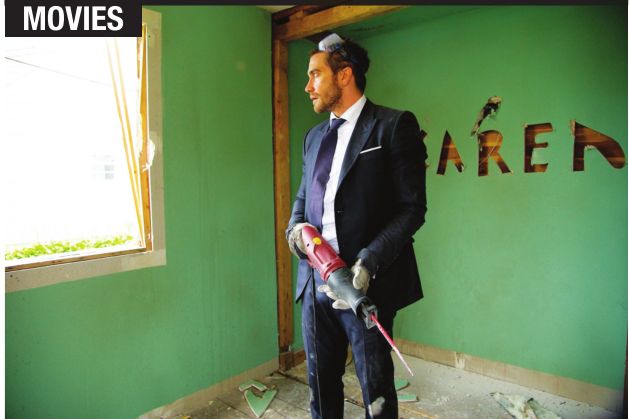
One thing you can always count on with Jake Gyllenhaal is that he will devote himself fully to any role he takes. However, I fear that his ambition and dedication are beginning to outdistance the material available to him. He proved to be the best thing about his last two features, Southpaw and Everest, projects that fell short of their lofty goals, despite Gyllenhaal’s hard work and dedication.
Unfortunately, this trend continues with his latest feature Demolition, as the actor once more finds himself toiling in the service of a project that’s beneath him. Facile and unsure of what it wants to be, director Jean-Marc Vallee (Wild) shows a surprising lack of focus here as the film vacillates between high tragedy and black comedy, unable to sell the one with the appropriate degree of gravitas, while a lack of conviction on everyone’s part ensures that some much needed levity goes unrealized.
Gyllenhaal is Davis Mitchell, a young investment banker whose wife Julia (Heather Lind) is killed in a car accident. While the young woman’s parents (Chris Cooper and Polly Drape) are beside themselves with grief, the new widower shows little emotion in the face of this tragedy and goes about his life as if nothing has happened. The one place he shows any degree of reflection on the matter is in letters he writes to a vending company that he’s requesting a refund from, as one of their machines stole his money. These are long, introspective missives in which Davis tells of his life with his wife and the relationship he has with his father-in-law, who also happens to be his boss.
His letters are answered by a quirky woman named Karen, played by the ever-attractive Naomi Watts, which is the first sign this movie is in trouble; the fact that she has a foulmouthed, brighter-than-his-years teenage son is the second.
Bad enough that the film suffers from a terminal case of the cutes, the characters are so poorly drawn that it’s impossible to feel anything for them. Davis begins tearing things apart – first his refrigerator, then his computer and eventually his house – in an effort to see what makes things work. The metaphor is obvious, as he’s unable or unwilling to look inside himself to see why he’s not working. Yet, we get no background on Davis. Where does he come from? What kind of relationship did he have with his wife? Did he act this way with others in his life as well? Without any context, the character comes off as nothing but an eccentric created by writer Bryan Sipe to cause chaos for chaos sake. There’s nothing tangible about him and as a result, Gyllenhaal is left floundering.
As for Karen and her young son, they were obviously selected from the stereotype file in Sipe’s screenplay program, as there’s nothing distinctive or original about them. Yes, they have their own idiosyncrasies but they don’t come from an organic place. Her tendency to stalk Davis and read his letters in the bathtub are there simply to make her look cute rather than give us a clue as to what makes her tick. Watts struggles mightily with the part but the material simply isn’t there for her to build a believable character upon.
Demolition is so obvious about its and its character’s quirkiness that when it finally delivers a devastating twist, it comes off as a cheap soap opera device rather than the show-stopping revelation it’s intended to be. The overall lack of narrative sincerity does this one in before it begins, as its premise is used as a showcase for odd behavior while honest emotion ends up being just so much collateral damage.